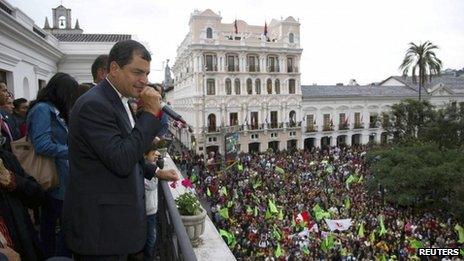Ecuador election: President Rafael Correa wins new term
- Published

Ecuador's President Rafael Correa has been re-elected for a third term with more than 50% of the vote. His main challenger has admitted defeat.
Addressing his supporters in the capital, Quito, Mr Correa called for "another four years of revolution".
First elected in 2007, the socialist leader is widely credited with bringing political stability to a nation that suffered decades of protests and coups.
But critics accuse Mr Correa of being a dictator in the making.
The 49-year-old US-trained economist has been accused of implementing policies that have served to strengthen his hold on power and erode the influence of political opponents and private media.
But his so-called "citizens' revolution" has made him popular with many ordinary Ecuadoreans and has won him friends among other Latin American left-wing leaders.
'Ecuadoreans in charge'
Partial results give Mr Correa 56.7%, ahead of 23.3% for his nearest rival, former banker Guillermo Lasso. The third-placed challenger was poised to take 6.6%, with four others trailing below 5%.
The BBC's Irene Caselli: "Correa has implemented a lot of social reforms"
To avoid a run-off, the president needs to win 50% of the total vote or 40% plus a 10-point margin over the second-placed candidate.
Speaking on TV after 40% of the votes had been counted, the head of the National Electoral Council said the final result would not be significantly larger or smaller.
President Correa was quick to claim victory.
"Nobody can stop this revolution," he told a crowd of supporters gathered outside the balcony of the Carondelet Palace in Quito. "The colonial powers are not in charge anymore, you can be sure that in this revolution it's Ecuadoreans who are in charge."
"We are here to serve you," he added. "Nothing for us, everything for you: the people who deserve the right to be free.
"This is not just a victory for Ecuador, this is a victory for the great homeland of Latin America."
'Sun King'
During his six years in power, Mr Correa has expanded access to healthcare and education and improved thousands of miles of highways, creating many jobs in the process. Poverty rates have dropped significantly.
"For years, this country went from government to government," Lorena Morocho, a 33-year-old civil servant, told the BBC. "I don't like certain things [Correa] does, but he is a great leader. I am voting for a project of hope."
But critics say that, since coming to office, he has filled the courts and government positions with allies and stifled free speech by taking on the media.
They also complain he has restricted free enterprise with heavy taxation and regulatory changes and taken government spending to an unsustainable level.
Mr Correa is close to Venezuela and Cuba and has sought to establish ties with Iran and China. Last year, he upset the US, Britain and Sweden by granting asylum to wanted WikiLeaks founder Julian Assange at the Ecuadorean embassy in London.
"I don't recognise the current Correa. He is a different person. He is not the friend I used to have, that I used to love like a brother," Alberto Acosta, one of the co-founders of the Alianza Pais governing party and now an opposition candidate, told the BBC.
"He controls everything. He is a sort of Sun King of the 21st Century," he said referring to France's King Louis XIV.
Since 2007, Mr Correa has re-written the country's constitution: a move that allowed him to run for, and win, a new term in 2009. He is legally barred from running again after this election, the Associated Press reports.
- Published27 February 2013
- Published15 January
- Published13 February 2013